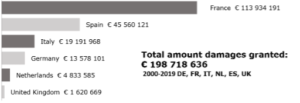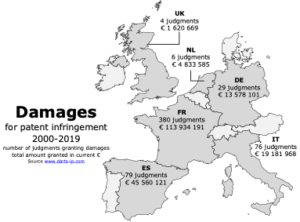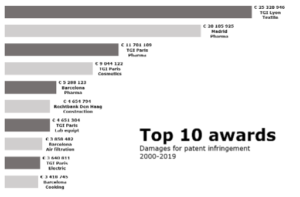My eminent colleague Pierre Véron, who needs no introduction here, is the author of a recent survey on the ranking of European jurisdictions in terms of damages awarded over the period 2000-2019 [1]The full version was published in English in Festschrift for President Meier-Beck in the journal GRUR (GRUR 2/2021)., which particularly caught my attention and of which I will make a brief summary in my own way here.
First and foremost, I would like to thank Pierre Véron, for such great work of course, but also for giving me permission to report its results, while entrusting me with the accompanying graphics, so that I can reproduce some of them here.
I must admit that the results of the study may be surprising, since they are so at odds with the idea that we generally have of European Courts. To me it seems, more especially, to complete the interviews Part I and Part II of French Judges that we had recently carried out, to undo certain untruths about the French system. Thus, I will deliberately adopt a “French bias” hereafter (which some will not fail to criticize); but after all I will just assume my role of French referent of the Blog.
Pierre Véron’s survey was conducted to identify judgments granting damages for patent infringement in the six most active European countries in patent litigation (Germany, Spain, France, Italy, the Netherlands and the United Kingdom) between 2000 and 2019. The total number of decisions granting damages was found to be 574 and the total amount granted € 198 718 636: France (380 decisions, € 113 934 191), Spain (79 decisions, € 45 560 121), Italy (76 decisions, € 19 191 968), Germany (29 decisions, € 13 578 101), the Netherlands (6 decisions, € 4 833 585) and the United Kingdom (4 decisions, € 1 620 669).
Here are some conclusions of this extensive census work.
1°) France was by far the first country for the number of decisions granting damages (380), followed by Spain and Italy in a tie (79-76); Germany was well behind (29); both the Netherlands and the United Kingdom handed down a very small number of judgments (6 and 4, respectively).
2°) The ranking of the countries founded on the amount granted is the same as that based on the number of decisions: France, Spain, Italy, Germany, the Netherlands and the United Kingdom.
The following Chart shows this information on a map including for each country reviewed the number of judgments and the total amount granted:
3°) In the top 10 awards, we find 5 decisions rendered by French courts, 4 decisions rendered by Spanish courts and one decision rendered by a Dutch court. The highest amount ever awarded by a Court in Europe was granted by the court of Lyon (€ 25 320 946 in a textile case in 2016).
The technical domain is pharma for 3 awards, the 7 others being textile, cosmetics, construction, air filtration, electric and cooking.
How can such results be explained? Let us remember that, although they may at first glance be surprising, these results are above all the result of specific jurisdictional characteristics and national “preferences”: a tendency to resolve disputes quickly in the Netherlands (after a preliminary injunction quickly granted in kort gedding or accelerated proceedings on the merits), another to prefer to stop the infringement and compensate with royalties in Germany, for instance, and a limited view of the damage when only infringement has been assessed.
In any case, Pierre Véron’s study offers us a European vision of patent litigation, which continues the reflections on the place (in Europe) where it is appropriate to initiate an action according to the result one wishes to achieve. May he be thanked for it here.
________________________
To make sure you do not miss out on regular updates from the Kluwer Patent Blog, please subscribe here.

References






Hi,
Do you think Apple case of $7 billion effects the cases in UK?
https://9to5mac.com/2021/07/12/apple-might-leave-the-uk/
The amount is going to change the position of UK dramatically.
Thanks for the link. I quote : “The second ruling that upset Apple is that the UK Supreme Court said that any decision it made on the amount the iPhone maker must pay would apply worldwide, not just to its UK sales.”
Indeed a dramatic change ! Is it acceptable for a UK court to assert such extraterritorial competence ?
Thank you to Matthieu (and Pierre!) for these remarkable statistics. Must we not conclude that rather than being ‘great’ the French are a litigious lot unable to settle their patent disputes;-)
UPC lobbyists at work.
Has the study been peer reviewed? Extraordinary claims, extraordinary evidence…..
The results shown are indeed surprising and it would be interesting to know which data bases have been consulted in order to come to this results.
It makes me suspicious when I see that the study stems from Me Veron.
He was the first to claim that Brexit was a hidden gift to France in that the duties allocated to the London Section of the Central Division should be transferred to Paris.
He even added that this gift should not be advertised too much so that France has better chances to get the gift.
Bad luck for him the Germans have uttered the same claim. See the explanatory note for the new ratification bill of the UPC.
In view of the necessary upcoming discussions on the relocation of the London Section, I do not think that it is by pure coincidence that this “study” has been published now.
Even Me Dhenne wants the London Section in Paris. I remember seeing his plea on this blog.
I would thus take this “study” not with a pinch of salt, but with a barge full of it.
I can only agree with Camparinos that a UPC lobbyist is at work.
More interesting to me would be whether the French first instance judgments as to the amount of damages were reformed on appeal – up, down or the same ? That would give a measure of the relevance of these TGI decisions, and and indication as to how well they actually approach the question of the assessment. The expression “au pifomètre” springs to mind…